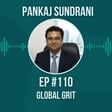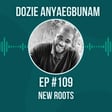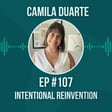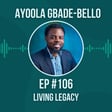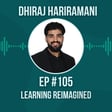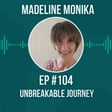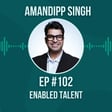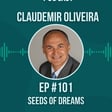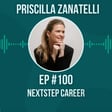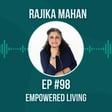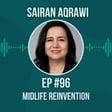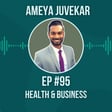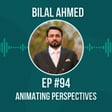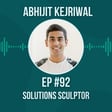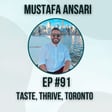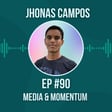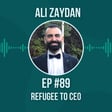Introduction to Sanjeev Kumar and Careframe
00:00:32
Find A Way Podcast
Welcome everyone, this is episode 99, Gen.AI Healthcare, care and today our guest is Sanjeev Kumar. Sanjeev is the founder of Careframe, a startup focused on accelerating research in healthcare.
00:00:45
Find A Way Podcast
He's a dental graduate with a master's in health services and demonst administration from the University of Michigan. During his education at the University of Michigan, he worked in the engagement team of the project learning health system at the university, third century initiatives as a research associate.
Sanjeev's Academic and Professional Background
00:01:01
Find A Way Podcast
They presented their work at the 48th Hawaii International Conference on System Sciences. Sanjeev holds a patent for the application of auto-encoder neutral networks to medication administration records aiding in identifying drug diversion by floor nurses.
00:01:19
Find A Way Podcast
motivated ah Motivated by the potential of scaling clinical research with Gen.AI led to the inception of
Careframe's AI Integration in Healthcare
00:01:26
Find A Way Podcast
Careframe. Welcome, Sanjeev.
00:01:28
Sanjeev
Hello, thank you for having me here.
00:01:31
Find A Way Podcast
It's a pleasure for you to be here with us today. And before we kick off with the other questions, can you tell us more about your business?
00:01:39
Sanjeev
Yeah, so at Careframe, we are looking at streamlining and reducing the gaps and the extra time that takes in moving from one research process into other ones. So if you look at research as a sort of as a start to the end process, and you can sort of break it down into 100 smaller individual steps.
00:01:57
Sanjeev
At Carefirm, we're looking into combining several of those steps into smaller ones, sort of integrated ones, and have AI make those decisions. So steps such as literature search, as statistical scientific testing, evidence collection, hypothesis testing, managing all of these evidence in an immutable blockchain, all of those tasks from start to the end, from having the idea of whether an intervention works or not, whether a medication, this dosage is better or another dosage is better.
00:02:24
Sanjeev
Our open source platform allows you to have that idea and it will do the rest of the things for you, including connecting to your data, getting your data, understanding your data, processing your data,
00:02:36
Sanjeev
ah doing rest of the ah important scientific so statistical testing on top, as well as looking at all the past publications of other researchers in the world who might have done similar similar research before and see if there were results that could be used from there, and combining all of that and pushing it to the front line so people can actually make actionable decisions without having a scientific research background. So most clinicians MDs, dental surgeons or other people don't have informatics background, but they do have a lot of intuition on this may work, this may not work.
00:03:11
Sanjeev
So kind of taking their intuition and giving them tools so they can get answers back without having the technical knowledge. But the answer that they get back should be as robust and as qualifiable to be scientific evidence.
00:03:25
Sanjeev
So the quality of evidence and quality of research has to be top notch and has to be very, very high grade. And that's kind of another thing that we want to do. is Of course, we want to streamline and reduce the gaps.
00:03:35
Sanjeev
We want to also elevate the quality of the clinical evidence that is collected. So that's kind of another focus of ours. Anything that has to do with collecting evidence, moving it to the clinicians and making it easier for them to interpret interpret and use, that's kind of where we come in.
Generative AI's Role in Healthcare Research
00:03:50
Find A Way Podcast
um Scaling clinical research with Gen AI is a very bold mission.
00:03:56
Find A Way Podcast
What do you identify are the main challenges and, of course, opportunities that you see integrating this generative AI into healthcare care research?
00:04:08
Sanjeev
Yeah, yeah. So as you said, JNI and healthcare research is a very big topic. ah For a company to have that as a vision that they're going to solve it, of course, it requires a lot thought behind it. So before the inception of Carefrem, I spent about four or five months ah doing lots of R&D planning on my end, seeing what other companies we were competing against. This is back in October 2023, before we even started Carefrem.
00:04:36
Sanjeev
So the idea and inception has been there for quite a while. ah The original idea of scaling research as a service came from when I was working on a project with CDC.
00:04:49
Sanjeev
I was managing there from Henry Forsyth. We were one of the sites that CDC was funding, several other sites nationally as well. I was managing informatics and over the five-year period there were a lot of things that I learned about a ah what the management cares about in research, what kind of evidence is collected, what kind of interventions actually work, how are they managed, what are the things that funding agencies care about, ah how do they measure it, what changes do they care about, but do what do patients care about, you know, all ah all of those those things kind of ah if you
00:05:23
Sanjeev
from CDC working with them and then our team had some recognition as well. So we had this sort of a name and a recognition and an idea and we knew that this was working. So we could take that out and sort of scale it out.
00:05:35
Sanjeev
And one of the challenges that we had was we were working at one site, Detroit, and we wanted to scale it to Flint and ah ah Dearborn and other sites as well. would have required a person to start building resources for that site for that site. But if something is working, we should be able to replicate it and move it to other site, kind of just like a stamp.
00:05:53
Sanjeev
If this works here, it should be able to work there. Just the patient population is different, right?
00:05:59
Sanjeev
So if we can make this human decision making where I have to build some infrastructure for that site and for that site, essentially all doing kind of the same thing, how about instead of me making those decisions and AI can make those decisions, we'll just give the AI the IT layer That's sort of like this ah sandbox where it has all the tools as they are called in Gen AI, and it can kind of replicate a lot of those things.
00:06:25
Sanjeev
And this has been proven now ah back when we started Careframe last year. Gen AI wasn't as good. There are certain metrics that the industry industry keeps track of like GPQA and MMLU and other scores.
00:06:40
Sanjeev
Now there's so many of those metrics. But if you look at GPQA that measures PhD level scientific reasoning in AI models, most of them are pretty high above now, or above humans in a lot of cases. In most cases these days, in terms of coding, when you do statistical testing, you have to write Python code or whatever language of your preference.
00:07:01
Sanjeev
AI now writes code as the top 100 coder in the world. So it's all the humans are beneath it inter until when it comes to coding. And coding also includes statistical testing because coding statistics is a subset of programming.
00:07:20
Sanjeev
So it kind of it takes away the the need for a human to spend time on managing sort of these little tasks and AI can kind of save time and passing off of decisions from one human to the another. a lot of the times what happens is my perception of an intervention, ah just give me one second, going to drink water.
00:07:46
Sanjeev
Yeah, so what happens is and evidence, us humans are biased even though we don't want to accept it. And sometimes from years of working in a field, I may have some idea of this works, this does not work. But a lot of the times what happens is when we go and do the research, we're looking for evidence to that matches our intuition.
00:08:08
Sanjeev
We're not looking at evidence as this is objective evidence. It may may not align with my original idea that I had that I was funded for. But what happens is researchers more and more, we're finding it out now, even in big magazines, big big journals,
00:08:22
Sanjeev
Researchers will will cherry pick the evidence that suits their hypothesis that gets their drug published, move to the next level, next level. or next level So what we're discovering now is without a putting out a number, but the number is pretty high, like 40, 50% of the evidence is is a not reliable. I'm not going to say it's incorrect or it's corrupted, but it's unreliable.
00:08:45
Sanjeev
so ah And in healthcare, unreliability means loss of a patient's life. And if you've worked in healthcare, care even one patient life, one bad accident, one adverse event,
00:08:57
Sanjeev
can mean disasters for the hospitals. ah you know So all of these things really matter. And when it comes to getting care, patients don't even think about bias and you know evidence and and non non-structured, non-standard research and all of those things. They just assume that I'm getting the best treatment because, hey, I'm paying all the money that I'm being asked for.
00:09:17
Sanjeev
oh I'm not holding some money back and saying, no, I'm not going to give the money back till you tell me they read the research or the medicine you're giving me is the best medicine. The thing about white coat job is that people will just accept it.
00:09:29
Sanjeev
and They'll just accept doctors as the authority figure who will always do the right thing, but that's far from the truth. far from the truth Doctors are highly biased. you know They have their own personal lives. They work extra hard.
00:09:42
Sanjeev
A lot of them are unhappy. you know If you look into medical dental profession, lots of behavioral problems, lots of addiction-related problems in in in nursing staff as well, very common knowledge.
00:09:53
Sanjeev
So without understanding healthcare care and looking at healthcare care as a perfect system, we don't get to solve research. We have to look at it for what it is.
Challenges in Current Healthcare Research
00:10:01
Sanjeev
It's broken. And then go at solving sort of all those broken pieces and then move them together in a single flow so that the doctor gets that same experience that they get with a team where they can send an email to the team or they can call their statistician and ask them, hey, is this technically, effect size is valid enough for me to use it and in my in my in my clinic.
00:10:25
Sanjeev
But quite often, because this process can take months, one team will meet, then another few teams will meet, statistician will take several days, then the IRB approval will happen, or all of those things can take months, even up to years for simple decisions to be made.
00:10:40
Sanjeev
You know, a patient is not going to wait for simple decisions to be made.
00:10:43
Sanjeev
So what happens is a patient needed this research, caused that research to happen, but the A patient never benefited from it because there was a time required. And then patient B or C may benefit from it, but they're not exact perfect fits.
00:10:56
Sanjeev
So evidence also needs to be sort of customized to different, different patient populations. So all of those things make healthcare research extremely complicated because we're not Just talking about a statistical test, we're actually talking about adding context and all the other things.
00:11:11
Sanjeev
So Gen AI, again, comes in as a perfect substitute for human decision-making, and it's already exceeding humans in reasoning.
00:11:12
Find A Way Podcast
Thank you.
00:11:17
Sanjeev
It's all already exceeding, ah this is going to be for controversial, but a lot of people, even Google's research is saying that ah their medical reasoning is beyond human reasoning.
00:11:27
Sanjeev
And I can agree with that. And I'll give you a very sort of ah easy argument to hold on to that. A human will look at 10 data points to make a decision. They'll go off of their own learned knowledge in their own brain, you know, from their own medical education.
00:11:42
Sanjeev
Maybe, maybe they'll consult a another colleague of their at the coffee place ah about about this condition. But that's all they're going to do. You know, they're not going to strain themselves beyond a certain bandwidth that they allow for a patient.
AI in Medical Decision-Making
00:11:58
Sanjeev
What if, what if, every patient requires different kinds of you know thinking and deeper thinking and not deeper thinking, lighter thinking. That's kind of where compute time, Gen AI compute time comes in, where if a complicated case like cancer comes in, very complicated cancer with lots of other co-morbidities,
00:12:07
Find A Way Podcast
Thank you.
00:12:20
Sanjeev
A doctor may have like a meeting, they may come up with a distance, they may still miss so many other diagnoses, so many other sort of, you know, like things that may affect that may mediate their treatment through whatever treatment they're giving to the patient.
00:12:34
Sanjeev
So a human just doesn't have the cognitive bandwidth, so you know, to look into hundreds of different places. And AI is like, ah you know, like a feral beast. you You open it, it will go around, look at thousand places, or you can force it to look for two hours, force it.
00:12:51
Sanjeev
Keep searching for the answer. I don't care. Don't give me an answer. Keep searching for two hours, then give me a summary of all the answers. That saves clinicians so much time when you think about it, you know, and it removes all the all the bias and, you know, all the
00:13:02
Find A Way Podcast
And think.
00:13:05
Sanjeev
ah bias or or incorrect information as well. You know, like providers can quote miscorrect, incorrect information from the research that they remember 10 years ago, but they may think that the numbers they're coding are correct because humans always think we are correct, even though most humans are kind of delusional if you think about it. Yeah.
00:13:25
Find A Way Podcast
No, for sure.
00:13:26
Find A Way Podcast
And that's um because Careframe is such an interesting intersection of technology and healthcare. um And ah my next question was actually already answered, which is um how do you ensure that the these technological advancements remain focused on improvement improving patient outcomes, which you already mentioned on that.
00:13:44
Find A Way Podcast
So I appreciate it for asking you on that.
00:13:48
Find A Way Podcast
So um I am going to move into some... um questions about early journey and your inspirations, because you mentioned that you grew up in a modest home and you moved frequently in India.
Sanjeev's Personal Journey
00:14:01
Find A Way Podcast
So how did those experiences shape your curiosity and determination to explore opportunities abroad?
00:14:08
Sanjeev
I think that when I, you know, everybody, if they look at their life and they try to integrate all the major milestones in their life and they try to make sense of, oh, maybe this happened because this needed to happen or X, Y, Z, and you try to make sense of things.
00:14:22
Sanjeev
A lot of the times I find that there are periods in my life which don't make sense. ah So when people ask me that, why did I started this company? Or like there has to be a special, some some reason behind it.
00:14:36
Sanjeev
A lot of the times I'll just say like, I was just pointed in this direction. Like, Like this is what I'm supposed to be doing. And I just did it. I never really you know like planned it. like I never really planned that going to start this company one day. and like I always had in my mind that I'm going to start a company of my own maybe before my 40s. And after 40s, I'll become a VC or something. That that was always in my mind.
00:14:58
Sanjeev
So I was i was honored always preparing to have that knowledge kind of have available.
00:14:59
Find A Way Podcast
Uh-huh.
00:15:04
Sanjeev
But the childhood was completely different. you know like ah and My parents don't speak ah English at all. They don't even understand it English. So when I talk to my parents, so I talk in a completely different way.
00:15:17
Sanjeev
yeah ah When I went to the dental college, they did not know and you know, like medical terminologies. When I went to University of Michigan, they had you know ah had to understand ah what coursework we were doing, what city I was in.
00:15:32
Sanjeev
So they've been there sort of as a very strong mental support, I'll tell you that, like they 100% behind me always. ah But I've had to sort of figure out all of those things. So again, being in India, they they became financially well after a certain point. But before that, before I was 10 years old, we were also financially not that well.
00:15:54
Sanjeev
And we we moved around maybe every two years, every one year. So, you know, as a child, now I understand child psychology because I've had to, you know, work through my own things.
00:16:06
Sanjeev
But, you know, as a child, and and nothing against my parents, they did the very best that they could, you know. But if you think about it, you make friends and then you move to another place, you lose your friends. ah You move to another place, you lose your friends again.
00:16:19
Sanjeev
So I've always had to deal with making new friends all the time and going to new places and figuring it out. are very frustrating to a kid, you know, to not have a friends and, you know, and when you move around a lot, kids pick up on you all the time, you know, like this is a new guy coming in.
00:16:37
Sanjeev
But luckily, we were academically very well. So when we moved from one school to the other, we were ah getting scholarships, treated very well in the other schools. Principals would treat us very well.
00:16:49
Sanjeev
we would go I would go into competitions. So there was sort of a reputation as well. So not, you know, even though financially things were not working out, academically things definitely were working out for us.
00:17:00
Sanjeev
And we kind of knew my mother was always inspiring us to become a ah me, a doctor. That's how Indian families work. And my sister also, but she turned out, she went into, she lives in Australia now.
00:17:12
Sanjeev
She has is a chartered accountant now. She also went through her own path of first going into ah biotechnology and then another degree in in finance and then moving into accountancy. So but for both of us, me and my sister, I feel like change has been a constant.
00:17:29
Sanjeev
We have hated change growing up. We wanted stability, really wanted stability. That's why I moved to US as well, because finally I can have a regular job and be stable.
00:17:40
Find A Way Podcast
Thank you.
00:17:40
Sanjeev
And I lived like that for 10 years. I had a very stable job, you know nice things working out, very nice big house, you know, a nice car. My dog used to go around in the home and I wouldn't even know which room she's in.
00:17:54
Sanjeev
ah But then, you know, things happened and is saw I felt like a when I started Careframe, I felt this sort of calling where I felt like I have all this knowledge and what ah what a waste it would be if I did not apply myself. If I just chickened out And I became selfish and I told myself, hey, you're smart. You know all of these things. You know you don't have to, you have a comfortable job. Why bother? you know You're living in a place where people want to move and live in.
00:18:28
Sanjeev
But once that it starts, I'm sure like you know, entrepreneurs know that. Once that it starts, there's nothing you can do.
00:18:32
Find A Way Podcast
Thank you.
00:18:34
Sanjeev
There's nothing. that that That crumbling of the tower power moment, as you know they talk about, it's going to happen. There's nothing you can do. So I realized that This is my moment in life where I will have to, you know, like roll up my sleeves and not care about what people think and pursue this thing to the very end till I finish it.
00:18:56
Sanjeev
That's kind of where I was like, okay, I'm going to have to fix up my home. So I took couple of months, fixed up my home, painted my home, you know, like fixed up all the lighting, all the housing and by myself, you know, like little ladder around my home everywhere.
Entrepreneurial Challenges and Stoicism
00:19:10
Find A Way Podcast
Very self-taught.
00:19:12
Sanjeev
Yeah. And then from there, after we had a couple of hiccups, I was ah all also building my company and trying to sell my house and I was traveling back and forth between Toronto and and ah and Detroit.
00:19:25
Sanjeev
Takes about eight hours of drive. I did that over two, three months, maybe eight or 10 times.
00:19:32
Sanjeev
ah with my with my dog, ah you know, sitting in the back and I was listening to all sorts of podcasts and, you know, I've probably seen all stoic content on YouTube.
00:19:42
Sanjeev
If you you talk about, you know, like people say, like, how do you get motivated?
00:19:45
Find A Way Podcast
Yeah. Yeah.
00:19:49
Sanjeev
Well, hell yeah, you have to listen to every single thing because maybe there's some nugget in there that clicks with you, you know, and that click is what you need to get over that next mental hurdle that you've imposed on yourself.
00:20:01
Sanjeev
So it was a process.
00:20:03
Sanjeev
Initially, it was very difficult. You know, you have to change your life, sell your home that you built with everything, you know, um lose your friends there, lose your colleagues, all the colleagues that you know, move to a completely new place and then sell your car as well.
00:20:18
Sanjeev
Lots of change. I was sort of in a difficult place for first few months, but that's natural. Everybody goes through that initial phase of not knowing and then they build up their intuition, you know,
00:20:31
Sanjeev
Then they have some clarity of what they need to do.
00:20:31
Find A Way Podcast
For sure.
00:20:33
Sanjeev
And then they face a test of, are you going to purs pursue that clarity that you've received? you know ah That was for me maybe last year around May or June when I went to collision.
00:20:45
Sanjeev
But there's something that happens to me when I talk about my vision with people, I get super inspired. And when I get super inspired, I really go on my own and I don't care about society and I just go and build it.
00:20:59
Sanjeev
Like to me, it doesn't matter.
00:21:03
Sanjeev
It's difficult to explain ah to people that don't think like this. But once you set your eyes on something, you do what yeah or you do not face it.
00:21:13
Find A Way Podcast
For sure.
00:21:14
Sanjeev
Or you do not face the work. Like this this is how I see it.
00:21:18
Sanjeev
And everything that stands in the way of that vision, will be decimated one by one.
00:21:26
Find A Way Podcast
I love that.
00:21:26
Sanjeev
That's the kind of mindset you need.
00:21:28
Find A Way Podcast
you um You did mention ah how stoicism, and I am interested in learning how it's ah stoicism itself, philosophy, and any analytical psychology that I know are some of your passions.
00:21:43
Find A Way Podcast
How have these influenced your leadership style and your decision-making as a founder? I would love to hear about that.
00:21:49
Sanjeev
Absolutely. Absolutely. I think ah founders, the first big challenge beyond the fluff, not the fluff, everything is important, but I would say one of the biggest challenges founders face is how to get ahead of being delusional.
00:22:05
Sanjeev
Because founders have to be somewhat delusional to move ahead of something that society deems as cannot be done. yeah So you you have to kind of get get away away from there, but To clear up all of these self-imposed limitations and delusions and to reach to that clarity, you have to either meditate, so do self-awareness, self-introspection, where you bring all the illusions that you have or ideas that you have about yourself, about your company, about your vision, and you sit or sit with them for a period of time.
00:22:46
Sanjeev
you You literally just sit with these ideas and you sit with them in your mind and you just meditate on them. And over time, these ideas reveal themselves to you in more and more clarity, in more and more clarity as in,
00:22:59
Sanjeev
Should I be building this additional module? No, it's not worth building that additional technical module. First, you should introduce the idea to the to the users. you know Collect some feedback. Don't go about building everything on your own.
00:23:12
Sanjeev
So these little sort of things that are critically important, but because a founder can really be lost in a maze and there's nobody to help him. A founder is all on his own. That's why you need co-founders.
00:23:23
Sanjeev
But if you're a solo founder, it's even even more difficult. So meditation and stoicism kind of helps you you see beyond your emotions fooling you. Because your emotions will fool you every now and then. you know You'll feel anxiety every day. Every founder deals with lots of anxiety. And you know you initially struggle with a lot of depression as well because you don't really know. You've taken taken a very big risk. It's going to work out. It's not going to work out. you know So you kind of have to work ah through these things.
00:23:48
Find A Way Podcast
Thank you.
00:23:51
Sanjeev
And stoicism is a really nice sort of ah I wouldn't say a starting point, but it's starting point to a lot of things that come after it ah without going too much deeper into it. But of course, like clinical inep ah sort of analytical and depth psychology, to me, I found them out of choices.
00:24:11
Sanjeev
So ah around the same time when I was thinking about starting my company, a couple of years before that, one of my bosses gave me several books of call you and ah I didn't even pay attention.
00:24:22
Find A Way Podcast
Thank you.
00:24:25
Sanjeev
my dog My dog bit one of the one of the you noah bit one of the books and you know the other one was lying in in a dust and I wasn't paying attention. I was just living my life, you know like regular nine to five guy, living his life, going to the gym, not caring about all of those things. But once once i once again, once that itch and the thought came that um this is my time and I have to do it,
00:24:47
Sanjeev
Then I kind of like got rid of all of all of these sort of I was going to the gym, but not focused as much. You start realizing what is your true North star.
00:24:58
Sanjeev
Once you realize what is your true North star, working out is important, but beneath true North star. Talking to somebody is critically important, but below true North star. So everything kind of like starts falling away in my mind.
00:25:11
Sanjeev
And as a founder, I could only see Careframe and the things that need to be built.
00:25:17
Sanjeev
And to the world, it may seem like Kframe is very complex. But Kframe was built one line of a code at a time. you know Every module was built separately, tested separately, brought together. So as a whole, it looks super complex with so many buttons, so many features, so many different things going on.
00:25:36
Sanjeev
But again, it was assembled one brick at a time, one brick at a time with the objectivity. not Not as in like, this is a fancy thing.
00:25:43
Find A Way Podcast
Thank you.
00:25:46
Sanjeev
It looks nice. Let's build it. No, versus thinking about, let's say, for example, subgroup analysis or mediation analysis. Typically, nobody talks about these things, but these are critically important in clinical research.
00:25:58
Sanjeev
Most researchers don't even employ subgroup and mediation analysis, but you actually really need these techniques and these algorithms. So to not stop at, you know, like, okay, this is good enough.
00:26:09
Sanjeev
and keep going from there till you've actually achieved the true North Star, where you are 100% sure that all the things are not more and not less, and exactly how they should be.
00:26:19
Find A Way Podcast
Mm-hmm. Right. Mm-hmm.
00:26:21
Sanjeev
So to kind of keep spending time to make sure that that setup works, is it requires a lot of mental mental effort, and stoicism gives you that mental effort because you don't let your anxiety, your own judgments control you.
00:26:36
Sanjeev
You kind of, you know, like ah how I see it, You detach yourself from it. You don't really care about in and out. You only care about pushing it forward every time. you don't You don't see if the progress is made tremendously fast. You don't care about that.
00:26:51
Sanjeev
You just care about some progress every day, some progress every day. Some days you will be in a flow mode. ah You'll be super inspired. You'll make 10 days worth of progress in a single day. I've had days where I didn't make any progress for several days because I i feel.
00:27:04
Sanjeev
sometimes you just have to wait for the universe to give you next messages.
00:27:11
Sanjeev
This needs to be done and all of that. But stoicism, again, allows you to take away that all of that but soism again allows you to sort of take away that Humanity is is important, but it puts delusions to founders and stoicism allows you to move away the emotions, not get super into them and just be emotional all the time and actually make progress and know that the progress you're making is a real progress and not some foo-foo-fluff progress.
00:27:41
Find A Way Podcast
I'm curious, when you did mention about meditation, do you do guided meditation meditation or you just do it on your own? ah Is there a specific type you find?
00:27:50
Sanjeev
So there are... Yeah, so there are, I feel like there are so many different stages to meditation. There are so many different ways of meditating. There are so many ways to prepare your body and your mind before a certain type of meditation.
00:28:04
Sanjeev
ah I would just stay say to people to figure out their own way, but a lot of the times the typical way that I found, or I'm more into stillness meditation, where
00:28:18
Sanjeev
I'm sort of in a place where when i when I'm still, i the thoughts automatically just just just stop. But initially what happens is lots of thoughts are gonna come, lots of ideas are gonna come, this needs to be done, this can be done.
00:28:30
Sanjeev
What happens is all those ideas that initially are coming through are all bad ideas, are all subpar, sub-quality ideas, low-quality ideas. And you have to let them pass and not jump on all of those.
00:28:43
Sanjeev
And then maybe a real idea will come out, a real spark of inspiration will will jump in after certain period has passed and you're aware that You can differentiate low quality versus high quality, you know, ah sparks ideas.
00:28:58
Find A Way Podcast
Mm-hmm. Mm-hmm. Mm-hmm.
00:28:59
Sanjeev
Once you can do that, then you have a better idea of, okay, if I spend three days building this thing, I'm not wasting my time. this This is a nicer idea. But of course, our intuition, our intusion ah human instinct is to jump on the first one right away.
00:29:13
Sanjeev
We don't you know like take time to evaluate the idea that came to my mind may not be perfect, may be coming with strings attached. At this moment, it looks good, but there is a price to be paid in the future.
00:29:25
Sanjeev
so You have to calculate and integrate all of this math and into your decision-making.
00:29:31
Find A Way Podcast
I love that. um i know from your bio and from our previous conversations that you enjoy mountain biking and traveling with your Malamute, your dog, right?
Building Resilience through Mountain Biking
00:29:42
Find A Way Podcast
ah How do these hobbies help you unwind and maintain your balance as an entrepreneur?
00:29:49
Sanjeev
Yeah, I feel mountain biking really gave me that initial ah insight into my own strength, that that there were things that I was telling myself that I'm unable to do, but I can.
00:30:05
Sanjeev
I feel every person goes through these life stages where they some truths are revealed to them that you're beyond this thing that is stopping you. Mountain biking was definitely one of them.
00:30:17
Sanjeev
It was completely new to me. I wasn't into mountain biking. I had a couple of friends that were doing it but were not regular. They were married people. Both of them had had kids. The other one was really busy in his work.
00:30:29
Sanjeev
So I just picked it up on myself. i i ah you know I got a nice rack. started going through simple easy trails around my home. um Not nice when you start something new as as you know like ah there are people that have been mountain biking for decades and people pass by you on trails so fast you're always thinking I'm never gonna be you know like am I in the way of these experts and why am I even here I should be programming and doing dentist work.
00:30:55
Sanjeev
yeah ah But mountain biking kind of showed me this this another side of me where trails that I thought I couldn't could not do. Okay, trails that I thought I could not go at night.
00:31:09
Sanjeev
ah Because I'm in a foreign country, even though I've lived here for 10 years, it's still different, you know, ah when it comes to taking risks, you should know that you're not in a native land, you know, so
00:31:10
Find A Way Podcast
Yes. No.
00:31:22
Sanjeev
I managed to go through all of those. I had a very major fall one time. I fell on the side of the hill and it was evening and nobody passed by for a long time. I was just lying there for a while and it was a very major fall.
00:31:37
Sanjeev
I kind of like flipped. I used to do downhill mountain biking. I kind of flipped over in the air, fell on the side and i had a lot of realizations while I was lying on the side of the hill that Nobody's going to come to save you. and And you have to, again, rise up by yourself. I shook my shoulders, got up, checked myself, went back again.
00:31:57
Sanjeev
You build this thing where, I don't know how to explain it, Bay.
00:31:58
Find A Way Podcast
Mm-hmm. knowledge thank
00:32:04
Sanjeev
It's like you build a mindset that is unbreakable. How do I put it? Like nothing can affect it. You have to build that kind of mindset. Mountain biking definitely helped me build that mindset, especially trusting my own body.
00:32:18
Sanjeev
trusting my own intuition and not giving up. Because a lot of the times in mountain biking, you may have gone to the, you know, like a done 30 miles in the in the noon and maybe your water is not, is now empty. You know, like you don't have water.
00:32:32
Sanjeev
You have to still go back to your car.
00:32:32
Find A Way Podcast
Uh-huh.
00:32:34
Sanjeev
Imagine driving, sorry, riding for 15, 20 miles and not having water. um and You have to sort of struggle with these things, but I would also do them deliberately. So i I'm sort of like mentally preparing myself
00:32:48
Sanjeev
to go through those things. And I did some of those things before starting my company as well. Like I would ah prepare myself physically and mentally to be able to go through, like I'll be traveling a lot. So I deliberately stayed in the cold for a period of time because I knew I'm going to be facing cold for a couple of months with all the moving.
00:33:08
Sanjeev
So I prepared my body.
00:33:09
Sanjeev
So there was a lot of preparation that went in. peak The world doesn't see the preparation. you know, the world only sees the product. So
00:33:16
Find A Way Podcast
Yes, always. Yeah. No, thank you for sharing that. um We're going to, of course, we're already stepping into some personal sides of Sanjeev, but ah there are a few questions that I always love to ask.
00:33:29
Find A Way Podcast
And one of them is, if you could have dinner with one person, with any person, alive or dead, who would that be? And it could be anyone. It could be a celebrity. it could be a lost relative, anybody in the whole world, alive or dead.
00:33:43
Find A Way Podcast
If you had a chance to have that dinner, who would it be?
00:33:47
Sanjeev
i can give so many answers. I have several people in my mind, both from a spiritual as well as a regular.
00:33:50
Find A Way Podcast
Okay. Mm-hmm.
00:33:57
Sanjeev
I would maybe pick somebody from history that had some appetite for
00:34:04
Sanjeev
expansion. And I would like to know from them, why did this stop?
00:34:10
Sanjeev
Like if you look at big empires, they which went on to become very successful, Genghis Khan, Alexander, all of these people.
00:34:19
Find A Way Podcast
Mm-hmm. Mm-hmm.
00:34:19
Sanjeev
And if you look into how their families evolved and what made them stop, was it psychological? What were the underpinnings? Because all of these people initially had messages to do big things.
00:34:31
Sanjeev
And somehow they realized that the the visions that they had were too big for but things and they must stop. So what maybe they were forcefully stopped.
00:34:44
Sanjeev
But I would like to know what decisions people have in their mind when they are not unstoppable. Like, what are they thinking at that time? That's what I would like to know. How are they evolving?
00:34:53
Find A Way Podcast
Mm-hmm.
00:34:54
Sanjeev
How are they comparing all the different things at that time when they are sort of moving through one unconquerable boundary to another unconquerable boundary to keep going, keep going, keep going?
00:35:05
Sanjeev
What kind of psychology do they i would like to have, you know, like a spicy chicken wings with them and understand but from maybe Genghis Khan on like, hey, why the cavalry? Why all these arrows? you know why Why not long swords or something like that?
00:35:22
Find A Way Podcast
Well, if you ever if you ever have that chance have that chance, please let me know and hear the answers.
00:35:31
Find A Way Podcast
We have this thing in the podcast that we always ask the previousview previous guest to leave a question to the next guest. And our previous guest wanted to ask you, what would your number one advice be as an immigrant entrepreneur who is looking to launch
Trust and Relationship Building in Leadership
00:35:46
Find A Way Podcast
themselves? Yeah.
00:35:48
Sanjeev
Trust the people around you um and keep investing in them. Don't expect anything from them.
00:35:55
Find A Way Podcast
That's beautiful. yeah like that.
00:35:57
Sanjeev
Trust them and don't don't expect anything because people also take time to build trust.
00:35:58
Find A Way Podcast
Thank you.
00:36:03
Sanjeev
You may be used to people giving you ah in return right away from where you come, but as an immigrant, you start at at a debt and you have to pay off that debt with trust.
00:36:03
Find A Way Podcast
That is
00:36:13
Sanjeev
And that trust takes four five months to build. So don't expect people to just because you are thinking a certain way others to do the same. Trust people and give it some time.
00:36:24
Find A Way Podcast
Love that. And if you could describe it in a sentence, what is success to Sanjeev?
00:36:32
Sanjeev
I think success is something that should be done objectively for the benefit of society, for the good of, for the common good without thinking about money or other things that to me that to me is a success worth striving for because money and fame comes as a byproduct
00:36:47
Find A Way Podcast
Mostly impact.
00:36:55
Find A Way Podcast
Beautiful, yes. um And if you could choose one superpower, what would it be and why?
Sanjeev's Philosophical Interests and Inspirations
00:37:04
Sanjeev
i would like to have the superpower if i had to be able to ground myself instantly.
00:37:10
Find A Way Podcast
Very, I take that too.
00:37:12
Sanjeev
Instantly, as in like, I think and I'm grounded. ah Because what happens is sometimes we get good news or temporary feelings of success, which which elevate ourselves in places that we shouldn't be going.
00:37:28
Sanjeev
And we should always remain grounded so we're able to be relatable. or or we can relate to others as well, because we can only all relate to each other objectively if we're all grounded.
00:37:40
Sanjeev
If everybody is delusional, if everybody is thinking this way, that way, that's why there's so much miscommunication. Nobody's grounded. if That's the one power if I could get, I would love that.
00:37:52
Find A Way Podcast
That's that's a very, I mean, you were the first person that answered that. So um I love that.
00:37:58
Find A Way Podcast
I love the, you know, the the different superpowers. ah I didn't even imagine like, yeah, that's a cool one. So I love, that's one of my favorite questions.
00:38:06
Sanjeev
but Now you probably heard 99 superpowers so far, or whenever you started this question.
00:38:09
Find A Way Podcast
Yeah, there's. Yeah. Exactly. I'm going to give you two options in the rapid fire question. I'm going to give you two options and you choose whatever aligns best with you.
00:38:21
Find A Way Podcast
Okay. It's books or movies.
00:38:28
Find A Way Podcast
um Dancing or singing.
00:38:32
Sanjeev
Both of them. Sounds good.
00:38:37
Find A Way Podcast
um Sunsets or sunrises.
00:38:43
Find A Way Podcast
And phone call or text message?
00:38:45
Sanjeev
um called hundred
00:38:47
Find A Way Podcast
Phone call. Okay. um One of the things Ingrid and I also, we love to collect is ah book recommendations. So we love to hear the books that have impacted our entrepreneurs that are highlighted here in our, um,
00:39:05
Find A Way Podcast
podcast and we'd love for you to share any book. It doesn't have to be, you know, business related, any books created an environment.
00:39:11
Sanjeev
Yeah, I wouldn't really share any business related. I feel like there's plenty of them and business involved by itself is also not that complicated. once You want to go through these books or basic knowledge, get an MBA, you're not struggling.
00:39:24
Sanjeev
But I think the deeper psychology is what what really gets to people. I am again, I'm not a big book reader, um to be honest, but I would say anything from Nietzsche or Jung is good.
00:39:38
Sanjeev
Man, any symbols, maybe?
00:39:41
Find A Way Podcast
Which one? Can you repeat that?
00:39:42
Sanjeev
man and and his symbols, maybe?
00:39:45
Find A Way Podcast
and so
00:39:46
Find A Way Podcast
um Thank you for that. See, another another one that we've never gotten. so love that.
00:39:54
Find A Way Podcast
um What would you like to leave the next guest as a question, Sanjeev?
Integrating Diversity in Teams
00:40:01
Sanjeev
What can you do to better integrate women into your workforce?
00:40:07
Find A Way Podcast
To better integrate
00:40:07
Sanjeev
Because they How can you better integrate women into your team?
00:40:12
Sanjeev
How can you build a more equitable team?
00:40:15
Find A Way Podcast
Ah, how can you build it? I love that. Okay. I love that. Before we close the episode, because I know we're running short on time. um Before we close this episode, is there anything that you would like to, you know, anything else you'd like to highlight or um leave here for our fellow listeners? Yeah.
00:40:36
Sanjeev
I feel like since all a lot of the people, listeners are are founders, and do not give up on your vision. Treat it as as your own child, as they say. And if people are saying this will not work or maybe that's a better idea, you can listen to them and you can respect them and agree with them, but do what you think again.
00:40:55
Sanjeev
go back Go back to day one on when you started that decision. every Anytime you slow down or you feel like you're becoming weaker, go back to day one. and get back in the founder mode keep getting back in the founder mode till you're done do not stop
00:41:10
Find A Way Podcast
I love that. There's a one thing, there's a book I love, which is Psycho-Cybernetics. And what you just mentioned, it's a lot. um I think one of the ways to keep up with that mentality is the success mechanism. Like when you focus on everything, when you look back, you know, you focus on everything you've achieved so far.
00:41:30
Find A Way Podcast
um It helps you give clarity for the future because you're not only focused on what you need to solve still, but everything, the long way you've come. So, building on that, I'm a big fan of celebrating achievements, even as little as they can seem like, but they um they represent so much along the way.
00:41:50
Find A Way Podcast
So, thank you for sharing that with
00:41:51
Sanjeev
That's a very nice thought. I totally agree. I think when you look back, you can integrate and strategize much better.
00:41:57
Find A Way Podcast
Exactly. And then it kind of gets it it explains, right? Why while you're going through that journey and where you're heading to. It gives, I think it increases the the value also of what we're building and the impact we're trying make.
Reflecting on Accomplishments and Gratitude
00:42:11
Find A Way Podcast
I love that.
00:42:11
Sanjeev
We usually cannot measure things in the in the current time and the value, real value comes with time as you said. Very true.
00:42:18
Find A Way Podcast
With one. Very true. Sanjeev, I cannot thank you enough for us being finally able to do this.
00:42:25
Find A Way Podcast
For those who don't know, we've had a few times some issues ah being able to book this episode, but finally all is solved and I'm so happy to have this conversation with you. I'm sure we're going to have multiple opportunities to continue to chat about all the other things that we enjoy and and share interests.
00:42:42
Find A Way Podcast
So i look forward to that ah future coffee.
00:42:46
Find A Way Podcast
ah But meanwhile, thank you so much for this.
00:42:50
Sanjeev
Thank you for having me. And I hope I was able to ah provide some insights to other founders and your other listeners that it was helpful. I'd like to be as objective and as honest about things.
00:43:01
Sanjeev
There were some things that I couldn't share because we are a business as well, but I'm really happy that you brought me here.
00:43:04
Find A Way Podcast
For sure.
00:43:06
Sanjeev
I'm really thankful to you.
00:43:07
Find A Way Podcast
It's a pleasure. Thank you. Well, this was our episode 99, Gen AI Healthcare care with Sanjeev Kumar. We'd like to thank all of our listeners and would like to remind you that we will be posting one episode bi-weekly, always with a different guest.
00:43:21
Find A Way Podcast
So make sure to subscribe on your favorite streaming platform.

